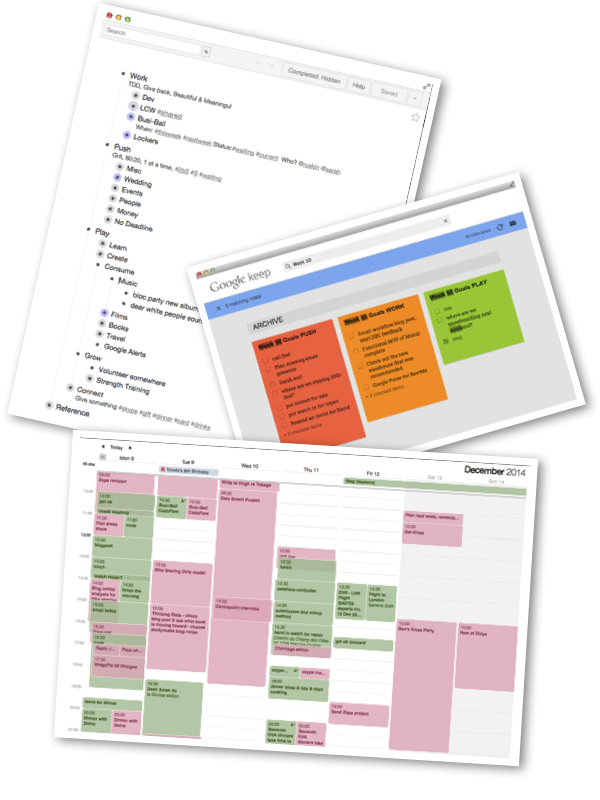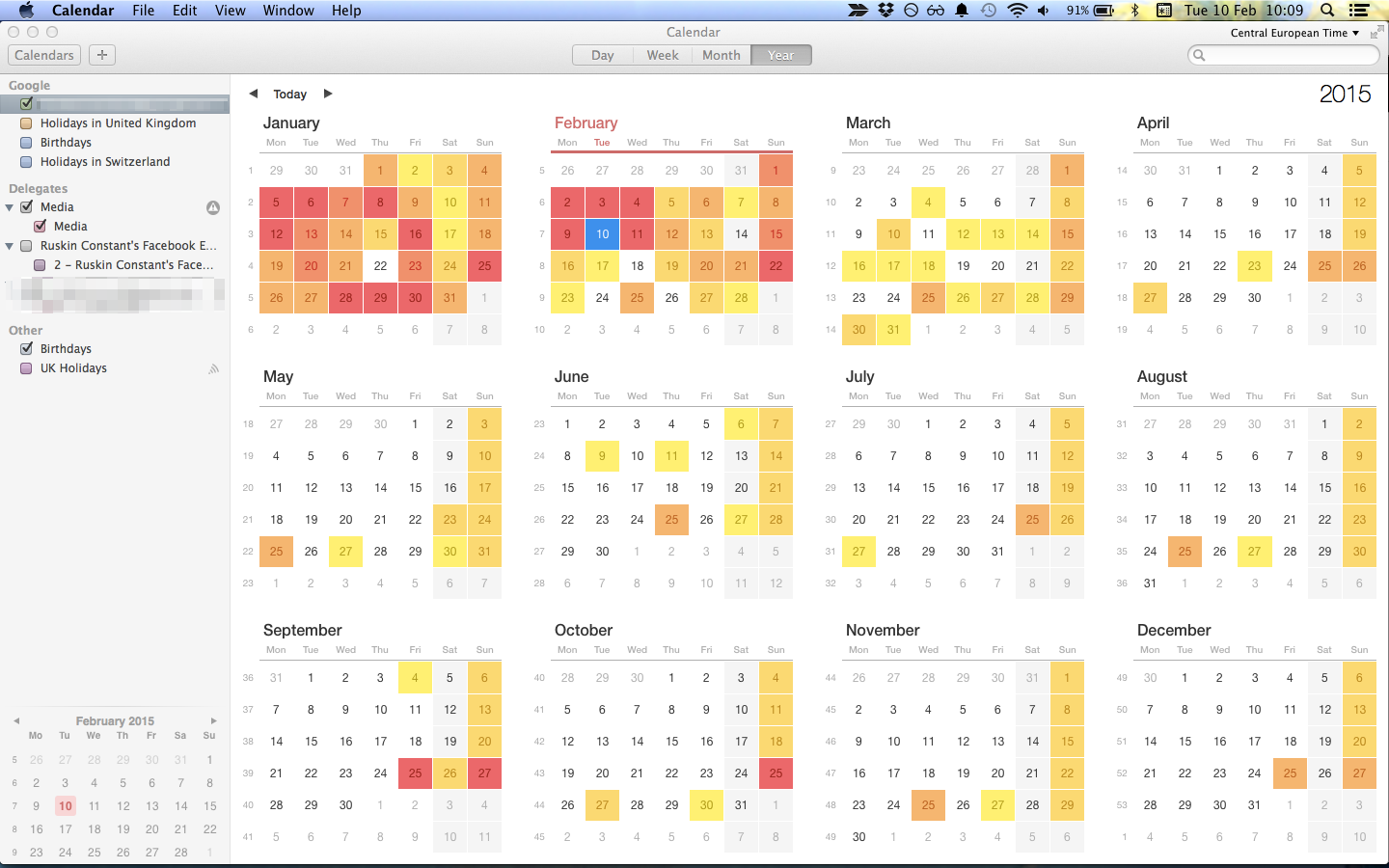How I Get Shit Done

Here’s what has been working well for me recently after many years of hunting for a tidy toolkit for taming that neverending todo list. There’s plenty out there to choose from but the challenge is finding an effective system that you can stick to with minimal effort. You need something that you can adhere to even on your laziest day, in the scattiest moments.
Of course just because you’re organised doesn’t mean that you’re motivated, but being organised certainly helps. Those fleeting sparks of “I will do ALL the things!“ should be nurtured as much as possible with a clear map to success.
Anything short of having a PA team at your behest is going to feel less than perfect, but my current setup is on a 4-month success streak that I’m excited to share and discuss. This post is a rundown of my spec for success, the apps I use, and how I combine them to get results.
My Spec
In abstract terms, I try to uphold these principles for staying on top of my tasks:
- “The faintest ink is better than the best memory” - write it all down somewhere or risk forgetting it.
- Calendar is King - if it isn’t scheduled then it will never be done.
- Strike a balance - between working, playing, and ‘pushing’ for both sanity and practicality.
- Keep things in context - how does this thing relate to everything else?
More concretely, I want to be able to deal with the following recurring scenarios efficiently and effectively, anywhere:
- What should I be doing right now?
- Can I realistically keep to this deadline/promise?
- This thing/idea is awesome! - I need to send it to where and/or when it makes sense.
- Where are all my collected ideas/things/resources relevant to X?
- What am I aiming to accomplish this week?
My Toolkit
Workflowy - “The faintest ink…”
The first minute of the video above sums up workflowy very well - it’s an aggressively simple web & mobile app that stores nested bullet-point lists.
Workflowy is where I dump absolutely all my ideas, goals, and worries in a giant set of lists to stop them from occupying precious mental space. I highly recommend having one single place for your giant braindump archive as inspired by the Getting Things Done aka GTD philosophy even if it’s just a notepad. Here’s the wikipedia summary:
“The GTD method rests on the idea of moving planned tasks and projects out of the mind by recording them externally and then breaking them into actionable work items.”
However that’s just step one - you have to actually do things, not just remember them.
Google Calendar / Ical - “Calendar is King”
 These calendar apps need little introduction or explanation and neither should the concept of scheduling your tasks to get them done. Nevertheless it’s worth mentioning 2 reasons why my calendar (and yours) should be king and not just a passive free-with-my-email-provider app.
These calendar apps need little introduction or explanation and neither should the concept of scheduling your tasks to get them done. Nevertheless it’s worth mentioning 2 reasons why my calendar (and yours) should be king and not just a passive free-with-my-email-provider app.
-
Time budgeting: Time is money, right? So I budget and record my ‘transactions’ accordingly with my calendar. I open it to check how much I have going spare before I commit to any big ‘spends’. This only works properly if you put everything into your calendar; not just the meetings and party invites, but also the solitary tasks and the periods when you’re just unavailable (e.g. travelling). As a somewhat visual learner, I find this exercise to be a powerful reminder of how little time there is to squeeze in new activities around established and/or inflexible routines. In short, this practice is what answers ‘can I realistically keep to this deadline/promise?’ - can I drag this little coloured box that represents the 2hrs of reading I need to do into a gap somewhere on this grid without overlapping something else?…If not, then what can I delete or shift til next week? etc.
-
Mono-tasking: Do Presidents ever check their watches so that they know when to head to their next meeting? Maybe sometimes, but I bet they rely heavily on their PA team to interrupt whatever they’re doing to update them on their schedule. Setting thoughtful reminders with my calendar items allow me to simulate that VIP peace of mind. Instead of worrying about when to start the next task, I can fully concentrate on what I’m doing right now. This blogpost by Eric Barker expands on this ideal very clearly.
Both ideals involve very heavy use of your calendar app of choice. I use google calendar because of its seamless integration with the rest of my google services such as email and mobile. However, Apple’s iCal (or Calendar as I think it’s called nowadays) has such an exquisitely smooth UI for weekly, monthly, and yearly views that I use it as much as I can. There are a few limitations in terms of inviting google contacts to events but it’s otherwise perfect for me.
Google Keep - “Strike a balance”
Google Keep is a very basic note-taking app that looks like a board of digital sticky notes. I use it as an intermediary step between pulling tasks from the master TODO list in Workflowy, and scheduling them on my calendar for the current week(s) ahead. Each week sees the same 3 coloured notes filled in - PUSH, WORK, and PLAY.
-
PUSH is for those tasks that are just part of the grind of life. It’s chores, it’s returning phonecalls, it’s repairing the bicycle…important tasks, but things that need pushing aside to make room for the really rewarding activities.
-
WORK is the kind of work that brings progress and satisfaction (not necessarily your dayjob).
-
PLAY can seem like overkill to actually schedule but I find it very motivating to proactively make time for the recreations I enjoy instead of hoping there’s enough leftover time between ‘serious business’.
Summary
In general my workflow involves looks like this:
- List (and keep updating) everything I might ever want to do in Workflowy.
- Decide which items I’m going to tackle for the week ahead, copying them from Workflowy to Google Keep.
- Schedule the relevant actions for the week using Apple Calendar, updating and adjusting daily.
Further Reading
People have and will be wrestling with best practices for todo/task/project management forever! There is no secret sauce or one-size-fits-all but there is constant innovation and fruitful discussion. Below are a mere handful of sources that have had a pretty big influence on my approach so far.
- 4-hour work week
- Work Play Fit Push Weekly
- 6 things the most organised people do
- Getting Things Done aka GTD
Feel free to feedback/add more in the comments below. I hope this can help inspire and/or inform your choice of weapons against the forces of idleness.